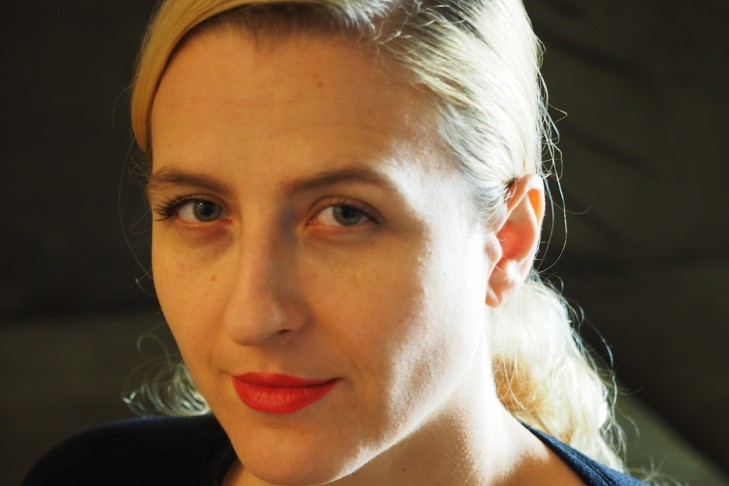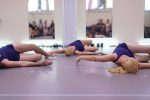The first time Guy Ben-Aharon, founder and artistic director of the Boston-based Israeli Stage, saw Nataly Zukerman perform in Israel, he knew he had to invite her to be Israeli Stage’s 2018 artist-in-residence. Zukerman, who will be in Boston from March 20 to April 9, is a performance artist whose focus is on disability, particularly her own. The 39-year-old artist was severely injured at the age of 12, when she sustained an acute neural back injury. That fact is dramatized in her piece for the stage called “Practice Makes Perfect”—a piece that Ben-Aharon says asks the questions, “What does perfect mean within this context? Is everything fixable?”
Zukerman will also perform excerpts from her other pieces, “The Other” and “Artability,” during her Boston residency. In those pieces, she traces her journey as both a woman and an artist who comes to own the word “disabled.” After each presentation, she will initiate a dialogue with the audience in the hopes of bridging the gap between Israelis and Americans, as well as the able and differently abled.
Additionally, biracial actor Nael Nacer will pair up with Zukerman for the world premiere of “The Othering Workshop.” In this devised capstone piece of Zukerman’s three-week residency, she intends to explore being “other,” or different, in both Israeli and American society. Ben-Aharon says that in the course of the performance, both actors will bring their parallel experiences of occasionally “passing” to the stage.
Ben-Aharon further reflects that Zukerman’s residency at Israeli Stage embraces his organization’s mission statement to share the diversity and vitality of Israeli theater with American audiences. “We’re bringing Nataly Zukerman, a young performance artist who epitomizes vitality,” he says. “Nataly represents the diversity of experience as a woman who is differently abled. She is not a classically trained playwright; she is someone who devises most of her work. It’s a different process and approach.”
Zukerman recently answered questions over email for JewishBoston about her creative process, her work and her life in Israel as a differently abled woman and actor.
Tell us about your creative process.
I always work from personal stories and questions I want to explore. That is always my starting point. And I devise material from that, creating images, building scenes and writing text until there is a show. It can take up to six months to devise it, but I work on each show many years before in my head.
Is highlighting the work of disabled actors a growing trend in Israel?
It’s only now starting to grow, but it’s at the beginning. We are a very small community of artists and aspiring artists.
How have your experiences as a differently abled woman shaped your life?
Because my disability isn’t noticeable for most people—and even when they hear about it they don’t really understand what it means—it can feel like there isn’t much effect. But now I realize I was excluded from many activities and fields in my life because of it. I was told that in the theater scene I should be backstage and not on stage. At school I was excluded from many activities. At the time, I thought it was for my own good. But, in fact, it meant that I was at home alone and not part of many social activities. If you ask Israeli people about their memories and meaningful experiences, they will talk about school trips or going to the army or flying to India to travel—those are all activities I could not do.
Can you tell us about “The Other Body” and “Artability”? What is the genesis of each of those pieces? Where have they been performed in Israel?
I created “The Other Body” in 2013, and I still run it in the Tmuna Fringe Theatre. I had produced shows about my disability before, but they were on a smaller scale. It was the first time I felt ready to deal with my disability in front of people. In a way, it was my coming out of the disability closet. The show talks about the emotional and physical scars of a woman, any woman. In my case, it is a disabled woman. It also talks about love, sex and intimacy, subjects that are not always associated with disabled people. In “Artability” I show a small part from “The Other Body” and talk about my coming out journey and the perception that Israeli society has of disabled people.
How will “The Othering Project” and the notion of “devised theater” come into play during your residency in Boston?
This past year, Guy and I had many discussions about the project, and Nael joined us when we spoke on Skype. We talked about questions that Guy and I find interesting and told stories about ourselves to one another. I’ve also worked on a few texts that I wrote. We’ll start working in Boston with all of this material. We’ll also keep devising, telling stories and creating images. I am very excited to work so closely with Guy and Nael, and I am very grateful for their generosity to share their life with me and to allow me to devise a performance from it.
Find information about Nataly Zuckerman’s Boston-area performances here.





